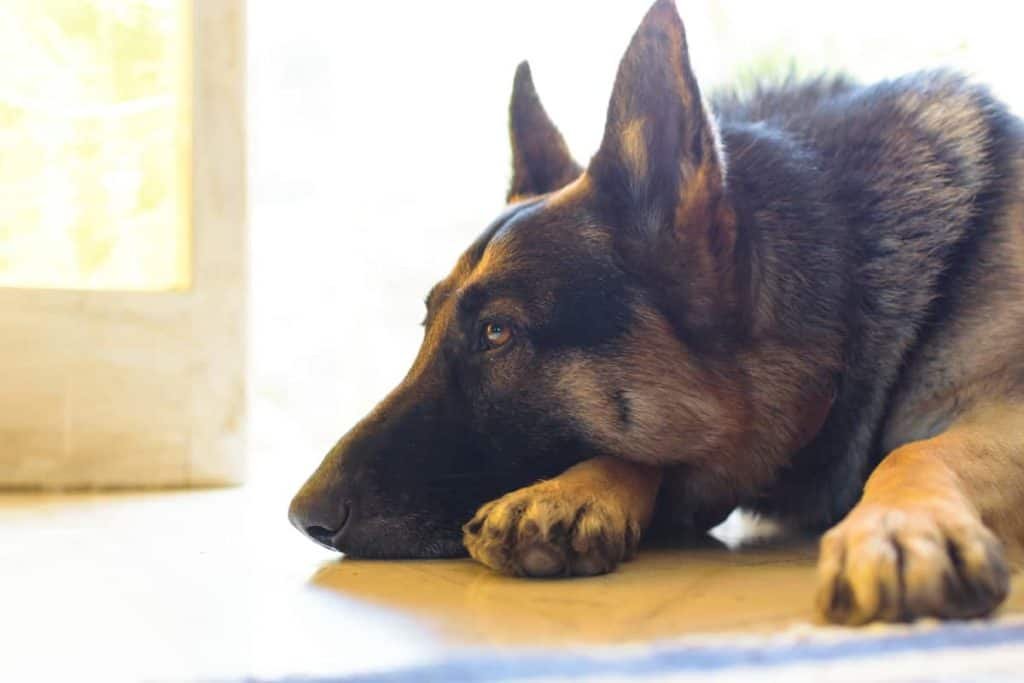Are you worried about your Female Dogs Leaking Brown Fluid from Anus? This is a common problem caused by a variety of medical conditions. In this blog, we’ll explore the causes of your dog’s fluid leakage and what you can do to help your pup.
Table of Contents
Why is My Female Dog Leaking Brown Fluid from Anus?
| Cause | Symptoms | Treatment |
|---|---|---|
| Anal gland problems | Leaking of brown or bloody fluid from the anus, scooting, licking or biting at the anal area | Manual expression of the anal glands, antibiotics if infected |
| Pyometra | Brown or bloody discharge from the vagina, lethargy, vomiting, loss of appetite | Surgery to remove the uterus, antibiotics |
| Urinary tract infection | Frequent urination, straining to urinate, pain or burning when urinating, brown or bloody discharge from the vagina | Antibiotics |
| Tumors | Brown or bloody discharge from the vagina, swelling or lumps in the vagina, vulva, or uterus | Surgery to remove the tumor, chemotherapy or radiation therapy |
| Injury | Brown or bloody discharge from the vagina, pain or difficulty walking | Treatment for the underlying injury, such as surgery or antibiotics |
Are you worried that your female dog leaking brown fluid from anus? You are not alone. Many pet owners experience this problem with their female dogs and it can be a cause for concern. But before you panic, it’s important to understand the possible root causes and be able to recognize when you need help from your veterinarian.
Below are five reasons why your female dog leaking brown fluid from anus:
- Urinary Tract Infection: Urinary tract infections are one of the most common causes of brown fluid leakage in female dogs. These infections cause the discharge of brown fluid from the urethra or anus. Signs of a UTI include pain during urination, frequency of urination, and discolored urine. If your dog exhibits any of these symptoms, it is important to seek medical attention to prevent further complications.
- Anal sac disease: Anal sac disease can also cause your dog’s anus to leak brown fluid. This disease is caused by the build-up of bacteria and other substances in the anal sacs. Common signs of anal sac disease include scooting, licking, and biting at the site. If you notice any of these symptoms, it is important to have your dog checked by a veterinarian as soon as possible.
- Perianal fistula: Another cause of brown fluid leakage in female dogs is the perianal fistula. These are deep, narrow tunnels that form between the anus and the skin. These tunnels become infected and discharge a brown fluid from the area. If your dog has a perianal fistula, she may be in a lot of pain and may need to be treated with medication.
- Coccidia: Coccidia is a parasite that causes brown fluid to leak from your dog’s anus. This parasite is commonly found in puppies, but it can also affect adult dogs. Symptoms of Coccidia include diarrhea, vomiting, and abdominal pain. If your dog exhibits any of these symptoms, it is important to have her checked out by your vet.
What is coccidia?
A microscopic parasite that can infect the intestines of dogs.
How does my dog get coccidia?
By ingesting oocysts (the infectious form of the parasite) found in contaminated soil or feces.
What are the symptoms of coccidiosis?
Diarrhea, weight loss, dehydration, lethargy, vomiting, and bloody stools.
How is coccidiosis diagnosed?
By examining a fecal sample under a microscope.
How is coccidiosis treated?
With drugs, such as sulfadimethoxine or ponazuril.
How can I prevent coccidiosis in my dog?
By keeping your dog’s environment clean and free of excrement, and deworming him regularly.
- Colitis: Colitis is a gastrointestinal disorder that can also cause brown fluid to leak from your dog’s anus. Colitis is caused by inflammation of the colon and can be caused by stress, food or infections. Symptoms of colitis include diarrhea, vomiting, and weight loss. If your dog has colitis, she may need to be treated with medication.
If your female dog is leaking brown fluid from her anus, it is important to take her to the vet as soon as possible. Your veterinarian can diagnose the underlying cause and provide the necessary treatment. It is important to remember that brown fluid leakage is a sign of a serious medical condition and should not be ignored.
How do I stop my dog’s anus from secreting?

When it comes to your dog’s health, it’s important to pay attention to any changes in their behavior and habits. A common problem that owners experience is when a pet’s anus starts leaking. This can be caused by a variety of different things and it is important to identify the source of the problem and take the necessary steps to prevent it from happening again.
The first thing to do when your dog’s anus is leaking is to take them to the vet for a checkup. Your veterinarian can diagnose the problem and recommend the best course of action. Common causes of anal discharge include parasites such as roundworms or tapeworms, anal gland infections, or anal fistulas. If the cause is a parasite, your vet will give your pet medication to clear it up. If it’s an infection or fistula, the vet may recommend surgery.
Also Read: Why Is My German Shepherd Sitting On My Lap?
Besides taking your pet to the vet, there are a few things you can do to prevent anal discharge. Make sure you keep your pet’s anal area clean. Check your pet’s anus regularly for any signs of irritation or redness. If you notice anything, take your pet to the vet as soon as possible.
You should also try to keep your pet’s skin healthy. Make sure they get proper nutrition and exercise regularly. If your pet’s anus becomes itchy or red, you can apply a small amount of a gentle ointment made specifically for pet skin.
Finally, if you notice that your pet’s anus is leaking more than usual, it could be a sign of an underlying problem. Consult your veterinarian to rule out any serious conditions.
By following these tips, you can help reduce the chances of your pet having anal discharge. Remember, though, that if your pet’s rectal discharge continues, it’s important to take them to the vet. Your veterinarian can help determine the cause and recommend the best course of action.
Symptoms of Brown Fluid Leakage in Female Dogs

It is important to identify the cause of the leakage so that your dog can receive the proper treatment. Below are three common symptoms of brown fluid leakage in female dogs that you should be aware of.
Unusual smell
One of the most common symptoms of brown fluid leakage in female dogs is an unusual odor. It can be caused by bacterial accumulation or blockage in the reproductive organs. If you notice a strange odor coming from your female dog, it is important to have her checked by a veterinarian as soon as possible.
Pain and discomfort
Pain or discomfort in the area of leakage can also be a sign that something is wrong. If your dog is whining, whimpering, or showing signs of pain or discomfort when the area is touched, take her to the vet immediately.
Abnormal discharge
Another symptom of brown fluid leakage in female dogs is abnormal discharge. It can be caused by many problems such as infections, tumors, and blockages in the reproductive organs. If your dog is experiencing unusual discharge, it is important to take her to the vet as soon as possible.
If you notice any of the above symptoms in your female dog, it is important to take her to the vet as soon as possible. While some causes of brown fluid leakage in female dogs may be minor and can often be treated at home, it is always best to have your dog checked by a professional to ensure the problem is properly diagnosed and treated.
What to Do If Your Female Dog is Leaking Brown Fluid
If you notice your dog losing brown fluid, it’s important that you take him to the vet as soon as possible. A veterinarian can examine your dog and determine the cause of the discharge. Depending on the underlying cause, treatment may include antibiotics, surgery, or other medications.
Here are some tips to prevent brown fluid leaks in female dogs:
- Spay your dog: Spaying your dog can help prevent pyometra and other uterine infections.
- Keep Your Dog’s Anal Glands Healthy: Regularly removing your dog’s anal glands can help prevent inflammation and infection.
- Monitor your dog’s urine: If you notice any changes in your dog’s urine, such as increased frequency, pressure, or pain, take him to the vet to rule out a UTI.
- Watch for signs of injury: If your dog is injured, look for signs of internal bleeding, such as brown or bloody discharge from the vagina.
By knowing what causes brown fluid leaks in female dogs and taking steps to prevent them, you can help your dog stay healthy.

